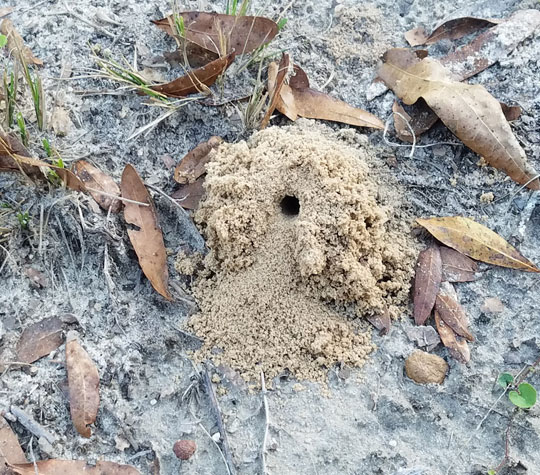
What are all these little mounds of dirt in my lawn?
This time of year, you might notice some industrious creature has been busy digging up tiny piles of soil around your lawn, pasture, or garden. If they look like this picture, don’t worry, it’s just a miner bee. These solitary bees emerge from the ground in the spring, and then spend their time pollinating plants and digging new nests for their young. They look a lot like bumblebees, though smaller and faster, and males have a little moustache.
They feed on pollen and nectar, making a little porridge of these substances in their underground nests to feed their young. They are harmless to humans, and don’t damage the plants they dig around. They will sometimes build nests in groups, but each bee builds her own nest (hence why they are considered solitary). The little piles of dirt they make and the holes that lead into the nest will disappear after a rain or two, so just leave them alone and know that the plants and flowers nearby are benefiting from these little creatures.
About the miner bee:
Anthophora abrupta, also known as the chimney bee or miner bee, is a gregarious, yet solitary, ground-nesting bee. The adult female digs a tunnel, often in clay, using the excavated earth to sculpt a chimney-like turret representing a single nest. Neighboring nests are clustered like a small village, but Anthophora abrupta are considered solitary bees because they have no overlap of generations and each female cares only for her own nest and future offspring.
Anthophora abrupta were described poetically by Rau (1929):
“…conspicuous as they noisily swing their ponderous bodies to and fro on the wing, arrive home and scramble into their burrows or come tumbling out headlong and dash off into the sunny fields, with all the exuberance of boys just out of school.”
Anthophora abrupta are not aggressive or even defensive of their nests and do not typically sting. When roughly handled they can defend themselves by biting, but are otherwise docile and should not be considered a threat. In fact, they are beneficial pollinators and have been recorded on a variety of flowers. Anthophora abrupta are not timid around humans, so the interested observer can watch as the turrets multiply and the adult bees stock their burrows with pollen and nectar.
Information courtesy UF/IFAS Walton County.
